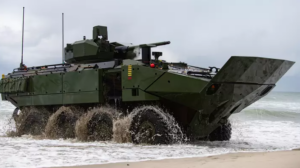The Marine Corps has awarded BAE Systems an $88 million deal to build several of its turreted variant Amphibious Combat Vehicles (ACV) for testing, the company said Monday.
BAE Systems said testing with the multiple ACV-30s, the version of its vehicle outfitted with a 30mm cannon, will inform the Marine Corps’ full-rate production decision for the variant.

“We are committed to equipping the Marine Corps with the best technology available to provide them with a decisive edge,” John Swift, BAE Systems’ vice president of amphibious programs, said in a statement. “We have carefully chosen proven industry partners who are equally committed to ensuring Marines have the capabilities to dominate on the battlefield.”
BAE Systems was previously awarded a design and development contract for the ACV-30, with the company selecting Kongsberg in May 2020 to provide the turret for the vehicle variant (Defense Daily, May 13 2020).
“The unmanned Kongsberg RT-20 medium caliber turret is designed to meet the current and future needs of the Marine Corps as they move forward in implementing the future operating vision known as Force Design 2030,” Scott Burk, president of Kongsberg Protech Systems USA, said in a statement Monday. “The fielding of this vehicle system provides the Marines with a low risk, and operationally proven solution.”
BAE Systems said the design of Kongsberg’s medium-caliber, remotely-controlled and operated RT-20 turret “eliminates the space requirement of legacy lethality systems” and provides “more space to transport troops or mission essential equipment, and reduces weight for better mobility.”
The Marine Corps is pursuing a family of vehicles approach for ACV, which includes the base personnel platform, a recovery variant (ACV-R), a command and control platform (ACV-C) and the ACV-30.
Both the base personnel variant of the ACV and the ACV-C are now in full-rate production, with the Marine Corps having awarded BAE Systems an $89.5 million deal for delivery of 14 of the command and control vehicles in May.
In March, the Marine Corps awarded BAE Systems a $173.6 million production order for 36 more ACV base personnel vehicles and a $34.9 million deal for design and development of the ACV-R (Defense Daily, March 30).
The Marine Corps has also previously tasked BAE Systems with integrating a suite of C4/UAS capabilities onto an ACV to study if such a platform could meet the mission requirements for the future Advanced Reconnaissance Vehicle (ARV).
Mark Brinkman, BAE Systems’ program manager of ACV family of vehicles design and development, told Defense Daily in May the company is eyeing the Marine Corps’ ARV effort as an opportunity to build out additional variants of the ACV, adding that offering a common chassis may provide ‘significant cost savings’ for the ARV program (Defense Daily, May 11).
Brinkman noted the Marine Corps in December 2020 designated C4/UAS as the lead variant for the ARV program and stated it wants to keep the option to look at a government off-the-shelf solution as a potential candidate to provide that platform.
At May’s Modern Day Marine Conference in Washington, D.C., BAE Systems showcased a C4/UAS, version of the ACV and a new Organic Precision Fires concept vehicle, which aligns with the first two mission role variants the Marine Corps has said it would pursue for the potential ARV program of record.
The Marine Corps in July 2021 selected General Dynamics [GD] and Textron Systems [TXT] for the 22-month ARV prototyping effort, with each company set to deliver a test vehicle in early FY ‘23 for a six-month evaluation to help inform whether to take the program into production (Defense Daily, July 16 2021).